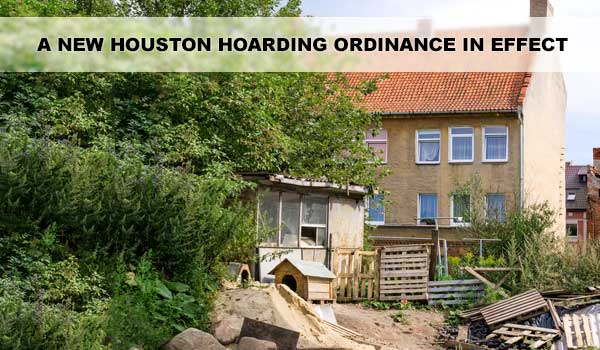What this means for your and your Texas HOA
Hoarding—If your Texas HOA hasn’t had to deal with it yet, you’ve probably seen a glimpse of it on some popular reality TV shows. It’s not a problem we’d wish on any community, but considering how rampant of a problem it is across the nation, there’s a good chance you could encounter it at some point in the near future.
The bad news? Hoarding can pose some serious health and safety risks for members of your community, particularly those who live in apartments, townhomes, and condominiums. The good news? It’s becoming easier for HOAs in Texas to legally deal with hoarders, thanks in part to the new anti-hoarding law passed by the Houston City Council. Let’s take a look at how that might affect your community.
Hoarding is usually defined as:
- The compulsive, disorganized collection of items (or animals) that individuals have an intense emotional connection to.
- The items are generally seen as useless or of little value to the average person. In other words, most people view the clutter as trash.
- The collection of these items becomes so extreme that it interferes with daily life and activities in the living areas.
But for most hoarders, the issue is deeper than just wanting to keep “stuff” around the house. It’s usually rooted with mental illness like anxiety or OCD, and that’s where the issue becomes a sensitive one for HOAs to address.
Hoarders become a risk factor to townhome, apartment, and condominium communities when their:
- Hoarded items spill out into publicly visible areas like the driveway, porch, or yard.
- Unsanitary hoarded piles (usually mixed with trash) start to attract pests like rodents, bed bugs, fleas, etc., which can also affect tenants nearby.
- Excessive piles of “stuff” block entrances and exits to the living space and also present a fire hazard to the building.
Most HOAs that discover or receive tips about hoarding situations are left to their own devices to remediate them. But if your community resides within Houston city limits, you may be able to defer that burden to local law enforcement. With the recently passed ordinance, hoarders can be fined up to $500 a day for posing a threat to public health and safety. The City of Houston has set a nationwide precedent for addressing this widespread problem, and the hopes are that other cities in Texas will soon follow suit.
Related: Waging War on Weeds in Your Community
But even if your community isn’t located within Houston city limits, you still have options when it comes to hoarding situations. Consider the following:
- Address Hoarding in Your CC&Rs – In order to enforce hoarding cleanup in your community, you need to first make sure that it’s addressed in your community bylaws.
- Take Advantage of Valid Inspections – Keeping tabs on the status of residences in your community in regard to hoarding is important. If residence inspections are required for insurance or local code compliance, use it as an excuse to scope out any potential hoarding situations.
- Act on Tips – If neighbors or other community members notify you of hazardous or problematic hoarding situations, don’t wait to act on it using the proper resources.
- Contact the Owner – If the hoarder doesn’t own the apartment, condo, or townhome, contact the owner first to notify them of the situation. The owner may be able to initiate eviction proceedings.
- Send a Violation Letter – If the hoarder does own the property, notify them of their violation of community bylaws and remind them that the safety of the community comes first.
- Reach Out to Appropriate Organizations – If the hoarding situation involves animals, you may be able to receive help from local Humane Society or animal abuse intervention organizations. If the hoarding situation is posing a serious pest or health risk, consider contacting your city’s public health branch to find out about your options for remediation.
But most important, try to first remember that hoarding is a mental illness, not just a violation or misdemeanor. Try to address the issue with sensitivity—and whenever possible, help the hoarding resident get the mental health resources they need in order to address the true source of the problem.
For more tips on managing HOA communities visit our Boardline Blog where we regularly update content, or feel free to contact us directly here.







